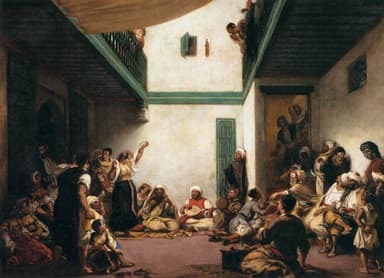Observation ·
How “Kratsmakh” Became the Yiddish Word for Christmas
By PhilologosBy way of an ancient Roman holiday and two very similar Hebrew letters.

Observation ·
By way of an ancient Roman holiday and two very similar Hebrew letters.

Observation ·
Like Ladino, Haketiya grew out of the Spanish of Jews exiled from Spain. Like Yiddish, it has a range of loving, spiteful, sarcastic, ironic, anxious, and superstitious expressions.

Monthly Essay ·
Abraham Cahan was one of America's first great Jewish newspapermen, and set an example of independent thinking that the nation could sorely use today.

Observation ·
"An earthquake in biblical scholarship” is how the discovery has been described. That's true, as are the connections it reveals between ancient languages and modern ones.

Observation ·
In some cases, changes were minor. In others, Yiddish phrases were transformed nearly beyond recognition.

Observation ·
The Jewish Soul: Classics of Yiddish Cinema , a recent collection from a major distributor, adds to the canon of Jewish movies in fascinating new ways.

Observation ·
A brief look at some of the many Jewish words relating to alcohol.

Response ·
Committed to developing and supporting the intellectual, religious, and political leaders of the Jewish people and the Jewish state.

Response ·
Committed to developing and supporting the intellectual, religious, and political leaders of the Jewish people and the Jewish state.

Observation ·
Why do Yiddish speakers refer to children by terms of endearment seemingly meant for adults?

Observation ·
A versatile fellow, this Cossack, identified simultaneously with Israel’s prime minister and his bitterest opponents! Who is he and who robbed him?

Observation ·
A brief history of an indifferent word.

Observation ·
And most of them reveal a hidden admiration for the person who’s had the wit and the grit to get away with it.

Observation ·
Let us sing of rodomont, Sinon, proditomania, and, in particular, grobian.

Observation ·
One word got turned upside down and downside up again.

Observation ·
Before becoming linked to the famous architect who was trying to escape it, the German word mies (rotten) made its way from Hebrew, to Yiddish, to a thieves' argot called Rotwelsch.

Observation ·
Contention was so much a part of modern Yiddish culture that, in any study of that culture, it was all but taken for granted.

Observation ·
There were many more illiterate Jews in the Tsarist empire than we tend to think there were.

Observation ·
A Mosaic reader was able to solve the mystery of the Yiddish expression tapn a vant, “to grope a wall.”

Observation ·
The many hypothesized sources for the saying, “To have butter on one's head.”

Observation ·
The tale of the pupik .

Observation ·
Philologos is quite certain the words of the prayer are in German, not Yiddish. But beyond that?

Observation ·
The hidden roots of the Yiddish-American expression "to shep nakhes . "

Observation ·
Which language was patient zero for the old expression, "We've been smallpoxed and measled"?

Observation ·
If you don't know what it means, you can probably figure it out. (Or you can read this column.)

Observation ·
In part, it borrowed extensively from the slangs and vernaculars of other languages. Consider the case of de la shmatte .

Observation ·
The process results from, in equal measure, Jewish separateness and Jewish assimilation.

Observation ·
A look at the phenomenon by which Yiddish words become English words under the influence of other, similar-sounding English words.

Observation ·
Where does the Yiddish word narishkayt come from?

Observation ·
What we learn from the story of the Russian phrase shakher-makher , or wheeler-dealer.

Unlock the most serious Jewish, Zionist, and American thinking.
Subscribe Now